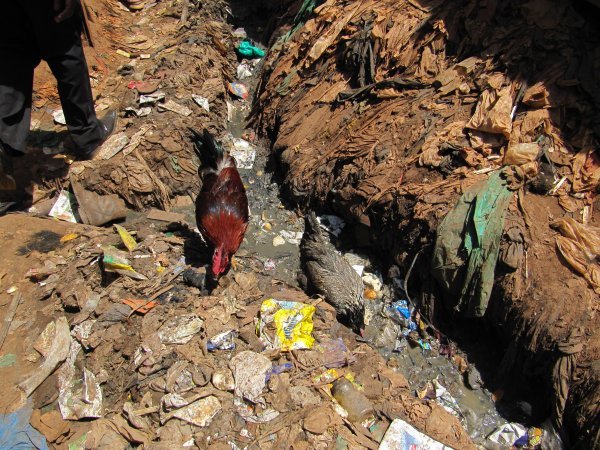Waste recycling in Mozambique through the establishment of Waste Transfer and Recycling Centres: Testing concept and formulation of bottom-up NAMA [NDF C62 B7]

The project has implemented a Waste Transfer and Recycling Centre in Beira and formulated a Nationally Appropriate Mitigation Actions programme (NAMA) in the waste sector in Mozambique
REGION
Africa
PROJECT REFERENCE
NDF C62 B 7
DURATION
2015-2018
NDF FINANCING
EUR 0.5 million
FINANCING TYPE
Grant
IMPLEMENTING AGENCY
NIRAS AS, Associação Moçambicana de Reciclagem (AMOR)
and Municipality of Beira
NDF CONTACT
info@ndf.int
Objective
The objective of the project was to increase the percentage of waste that is being recycled in Mozambique and, as such, directly reduce greenhouse gas emissions by avoiding waste disposal at uncontrolled landfills and indirectly by reducing the use of virgin materials.
Description
Waste management is considered as one of the key challenges of the 21st century. Growing urban populations are producing increasing amounts of waste that are typically ending up in uncontrolled dumpsites. This not only results in negative environmental and health impacts but landfills are also responsible for 8% of greenhouse gas emissions worldwide. At the same time, the market for recyclable waste has grown significantly over the last years creating new opportunities for sustainable waste management. Based on population data and per capita waste production default values from the IPCC, Mozambique generates an estimated 2 million tons of municipal waste per year. In Maputo, 80% of the municipal waste is collected and disposed at the municipal dumpsite whereas in other municipalities the collection rates vary between 20-60%. It is estimated that formal waste recycling rates are below 1% of the waste that is collected.
The project had the double purpose of constructing and demonstrating the viability of a Waste Transfer and Recycling Center (WTRC) in Beira, and formulating a bottom up NAMA framework for the promotion of waste recycling in Mozambique. Recyclable waste is being processed at the WTRC into value-added products for onward selling in national and international markets whereas non-recyclable waste is transferred to the municipal landfill for final disposal. During the initial phases, the WTRC focused on the processing of plastics, glass and metals. Organic waste is transformed into compost, briquettes and/or refuse derived fuel (RDF), depending on the local market conditions. Based on the information gathered during the development phase, and further informed by the implementation of the pilot project in Beira, the project has formulated a number of measures for removing/reducing existing barriers and risks using a NAMA framework. This will further enhance the waste value chain in Mozambique and create an enabling environment for private sector involvement in waste management activities in the country. The project has also laid grounds for potential replication of the WTRC in two additional municipalities in Mozambique, i.e. Maputo and Vilanculos.
The main outputs of the project were:
(i) NAMA proposal for the waste sector in Mozambique, which can be submitted to potential bilateral and multilateral donors, including stakeholder engagement in the process of developing the NAMA;
(ii) Pilot waste Transfer and Recycling Centre established and operational in the Municipality of Beira; and
(iii) Preparation for up-scaling in other Mozambican cities.
Relevance for Climate Change
The project has reduced the GHG emissions by increasing the amount of municipal waste that is being recycled and sustainably treated through waste recovery and value addition in Mozambique. At the end of the implementation period the project has been able to collect 52 tons of waste, out of which it recycled 38 tonnes (glass, aluminium cans and plastics), reducing approximately 18 tCO2e. At full capacity, which was not yet reached at the end of the project due to delays in construction, and is forecasted to be reached in 3-4 years, the Beira WTRC will be able to process 900 tonnes of waste per month, including the organic waste fractions, and will thus reduce up to 5,000 tCO2e per year. The project has an additional positive impact on adaptation to climate change as it contributes to diverting plastic waste from municipal drainage systems.
Innovation and Knowledge Transfer
The WTRC established in Beira is the first of a kind in Mozambique. Through the establishment of the WTRC, the project sought to increase significantly the recycling rate in Mozambique that currently is estimated to be 1% of the total disposed waste. The innovativeness of the project lied on the approach of the project because it links the implementation of a specific project on the ground with the formulation of a wider NAMA framework (bottom-up NAMA). The project was developed in close cooperation with Mozambican Ministry of Land, Environment and Rural Development (MITADER). The project has enhanced the capacity of MITADER and relevant municipal authorities for the development and implementation of NAMAs.
